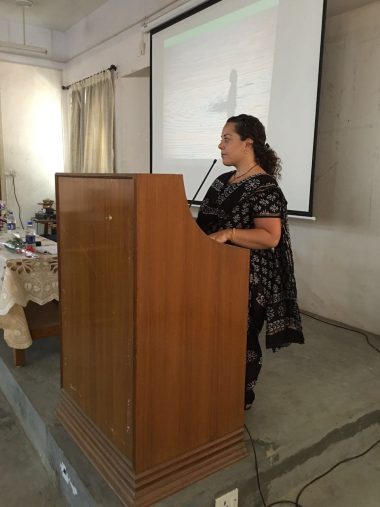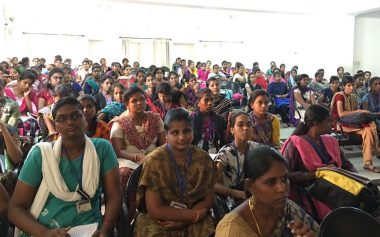Over the course of her sabbatical year in South India, Amy L. Allocco delivered three discrete invited lectures.

Her lecture, titled “The Cauvery River in the Tamil Landscape and Hindu Ritual Imagination: Notes on Aadi Perukku,” probed the categories of “tradition,” “heritage” and “culture” operative in the Hindu Aadi Perukku festival, which had been celebrated a few days prior to her presentation. This festival foregrounds agricultural themes and entails worship at water sources, especially the Cauvery River. Allocco’s presentation raised questions about the gender norms that are written into the festival and the gender expectations regarding personal fertility that are both implicit and explicit in its ritual observances.
Ethiraj College is one of the city’s oldest and most prestigious women’s colleges, with 6,500 students and a faculty of nearly 300 members. Allocco welcomed the opportunity to present on her research at this renowned institution, particularly because she anticipates connecting students on her and Professor Brian Pennington’s Winter Term “India’s Identities: Religion, Caste, and Gender in Contemporary South India” study abroad course as well as Elon Undergraduate Research students working in Chennai with faculty and students at Ethiraj College.

In late January she presented the opening address at the “Knots and Ties: Marriage and Family through Changing Times: Religio-Cultural, Gender and Ethical Explorations” conference at the University of Madras. Her paper, “From Sumangali to Samiyamma: Reframing Gendered Expectations on Marriage and the Family,” discussed how celibacy and religious efficacy may figure among the alternative life scripts available to Hindu women and explored the ways in which female ritual specialists may reconfigure the male ascetic ideal that predominates in Hindu traditions.
Earlier in the year Allocco presented a paper titled “Notes from Within and Without: Emic and Etic Perspectives” at a workshop on research methodologies hosted by the Asian Centre for Cross-Cultural Studies in Chennai. This two-day workshop was organized as a professional development opportunity for advanced graduate students and junior faulty members who would benefit from additional exposure to a range of research methods and approaches.
Allocco’s talk focused on the insider/outsider debate and issues concerning positionality, especially in anthropological research. Drawing on case studies from her long-standing ethnographic research in South India, Allocco highlighted epistemological and methodological questions related to feminist standpoint theory, reflexivity and authority in the research process.


